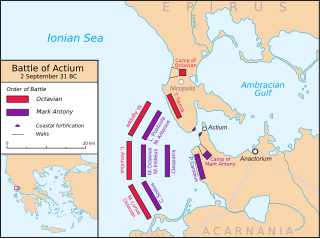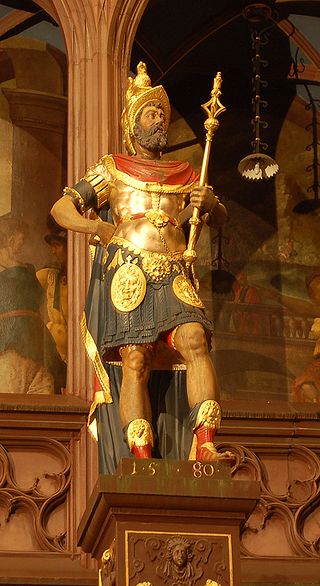Related Research Articles

Year 31 BC was either a common year starting on Tuesday, Wednesday or Thursday or a leap year starting on Tuesday or Wednesday of the Julian calendar and a common year starting on Tuesday of the Proleptic Julian calendar. At the time, it was known as the Year of the Consulship of Antonius and Caesar or as Caesar and Messalla. The denomination 31 BC for this year has been used since the early medieval period, when the Anno Domini calendar era became the prevalent method in Europe for naming years.

The gens Valeria was a patrician family at ancient Rome, prominent from the very beginning of the Republic to the latest period of the Empire. Publius Valerius Poplicola was one of the consuls in 509 BC, the year that saw the overthrow of the Tarquins, and the members of his family were among the most celebrated statesmen and generals at the beginning of the Republic. Over the next ten centuries, few gentes produced as many distinguished men, and at every period the name of Valerius was constantly to be found in the lists of annual magistrates, and held in the highest honour. Several of the emperors claimed descent from the Valerii, whose name they bore as part of their official nomenclature.
The ovation was a form of the Roman triumph. Ovations were granted when war was not declared between enemies on the level of nations or states; when an enemy was considered basely inferior ; or when the general conflict was resolved with little or no danger to the army itself. The Ovation could also be given rather than a triumph when there were extenuating circumstances, such as when Marcus Marcellus was given an ovation in lieu of a triumph as his army remained in Sicily and therefore was unable to cross the pomerium.
Gaius Vibius Pansa Caetronianus was consul of the Roman Republic in 43 BC. Although supporting Gaius Julius Caesar during the Civil War, he pushed for the restoration of the Republic upon Caesar’s death. He died of injuries sustained at the Battle of Forum Gallorum.
Lucius Valerius Flaccus was a Roman politician and general. He was consul in 195 BC and censor in 183 BC, serving both times with his friend Cato the Elder, whom he brought to the notice of the Roman political elite.
Lucius Valerius Flaccus was a consul of the Roman Republic in 100 BC and princeps senatus during the civil wars of the 80s. He is noted for his peace initiatives, which failed, and for sponsoring the Lex Valeria that created the dictatorship of Sulla.

The gens Annia was a plebeian family at ancient Rome. Livy mentions a Lucius Annius, praetor of the Roman colony of Setia, in 340 BC, and other Annii are mentioned at Rome during this period. Members of this gens held various positions of authority from the time of the Second Punic War, and Titus Annius Luscus attained the consulship in 153 BC. In the second century AD, the Annii gained the Empire itself; Marcus Aurelius was descended from this family.

The gens Antonia was a Roman family of great antiquity, with both patrician and plebeian branches. The first of the gens to achieve prominence was Titus Antonius Merenda, one of the second group of Decemviri called, in 450 BC, to help draft what became the Law of the Twelve Tables. The most prominent member of the gens was Marcus Antonius.
Lucius Caninius Gallus was a Roman politician who served as consul in 37 BC.
Marcus Valerius Messalla was a Roman senator who was appointed suffect consul in 32 BC.
The gens Duronia was a plebeian family at ancient Rome. Although relatively obscure, the family was of sufficient importance to hold a seat in the Roman Senate. Its members are mentioned during the first and second centuries BC.
The gens Gallia was a plebeian family at ancient Rome. Several members of this gens are mentioned during the first century BC.
Marcus Gratidius was a Roman statesman and orator from Arpinum during the late second century BC. He is best known as a result of his connections with Cicero and Marius.
The gens Hortensia was an ancient plebeian family in Rome. Members of this gens are first mentioned in the fifth century BC, but from that time somewhat infrequently until the final century of the Republic. The most illustrious of the gens was the orator Quintus Hortensius, a man of great learning, and a contemporary of Cicero. Under the Empire they seem to have sunk back into obscurity.

The gens Munatia was a plebeian family at Rome. Members of this gens are first mentioned during the second century BC, but they did not obtain any of the higher offices of the Roman state until imperial times.
The gens Oppia was an ancient Roman family, known from the first century of the Republic down to imperial times. The gens may originally have been patrician, as they supplied priestesses to the College of Vestals at a very early date, but all of the Oppii known to history were plebeians. None of them obtained the consulship until imperial times.
Lucius Valerius Potitus was a five time consular tribune, in 414, 406, 403, 401 and 398 BC, and two times consul, in 393 and 392 BC, of the Roman Republic.
Marcus Horatius Turrinus Barbatus was a Roman senator from the early Republic, who served as consul in 449 BC alongside Lucius Valerius Poplicola Potitus. According to Roman historical tradition, he and Valerius played an important role in ending the Decemvirate and bringing harmony between the patrician and plebeian orders. To the two consuls are traditionally attributed the Valerio-Horatian Laws, which gave full force of law to measures passed by plebiscite, restored the right of any citizen to appeal to the people, and confirmed the sacrosanctity of plebeian tribunes. The historicity of these laws has been doubted.
References
- ↑ Aulus Gellius 2.24.10; Macrobius 3.17.7; T.R.S. Broughton, The Magistrates of the Roman Republic (American Philological Association, 1952), vol. 2, p. 7.
- ↑ Cicero, De Oratore 2.274; Valerius Maximus 2.9.5; Broughton, MRR1, pp. 6–7.